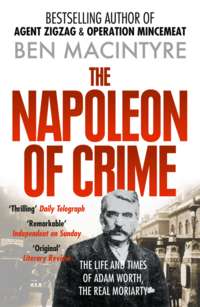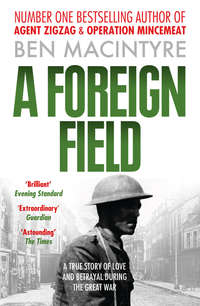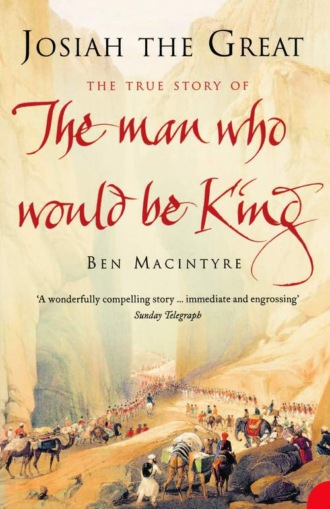
Полная версия
Josiah the Great: The True Story of The Man Who Would Be King

JOSIAH THE GREAT
The True Story of the Man Who Would Be King
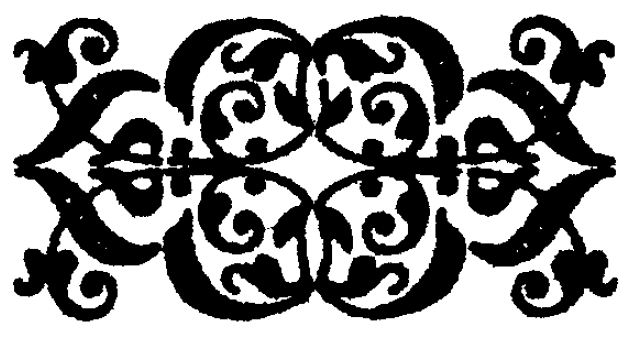
BEN MACINTYRE
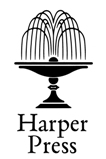
Copyright
Harper Press
An imprint of HarperCollinsPublishers 1 London Bridge Street London SE1 9GF
First published in 2004 by HarperCollinsPublishers
Copyright © Ben Macintyre 2004
Q and A with Ben Macintyre/A Conqueror Gone Native © Sarah Vine 2005
PS™ is a trademark of HarperCollinsPublishers Ltd
Ben Macintyre asserts the moral right to be identified as the author of this work
A catalogue record for this book is available from the British Library
All rights reserved under International and Pan-American Copyright Conventions. By payment of the required fees, you have been granted the non-exclusive, non-transferable right to access and read the text of this e-book on-screen. No part of this text may be reproduced, transmitted, downloaded, decompiled, reverse engineered, or stored in or introduced into any information storage and retrieval system, in any form or by any means, whether electronic or mechanical, now known or hereinafter invented, without the express written permission of HarperCollins e-books.
Source ISBN: 9780007151073
Ebook Edition © JULY 2010 ISBN: 9780007406852
Version: 2015-10-20
Praise
For automatic updates on Ben Macintyre visit harperperennial.co.uk and register for AuthorTracker.
‘Harlan is a fascinating figure, and Macintyre brings him magnificently back to life in a portrait that carries complete conviction. Josiah the Great is perhaps his most accomplished book: as compelling as it is humorous, thoughtful and well written … Ben Macintyre has succeeded in adding a completely new chapter to the tale, and one overlooked by all previous writers’
WILLIAM DALRYMPLE, Times Literary Supplement
‘The saga of the first Afghan war, one of the greatest disasters ever met by the British army, has been told many times before … But Ben Macintyre has found a wholly original angle on it. A riveting book and a valuable contribution to Great Game literature’
MATTHEW LEEMING, Spectator
‘With Afghanistan already long gone from the headlines, Ben Macintyre provides a timely historical reminder of the perils of messing about in foreign lands. The entertainingly improbable Josiah the Great is the ultimate in exotic’
JUSTIN MAROZZI
‘Ben Macintyre has extricated [Harlan] from obscurity, in a book as compelling as its subject’
Daily Mail
‘Ben Macintyre tells a wonderfully compelling story. Like so many of the best biographers Macintyre has fleshed out a figure who merits only a meagre index-entry in most histories but whose experience helps to bring to life an entire period’
PHILIP MARSDEN, Sunday Telegraph
For Barney, Finn and Molly
If I want a crown I must go hunt it for myself.
RUDYARD KIPLING, ‘The Man who Would be King’
Contents
Cover Page
Title Page
Copyright
Praise
Epigraph
Maps
PREFACE
PROLOGUE
1 A Company Wallah
2 The Quaker King-Maker
3 My Sword is My Passport
4 The Young Alexander
5 The Dervish From Chester County
6 From Peshwar To Kabul
7 Kabul, Conspiracy And Cholera
8 The Alchemist
9 Courtier Of Lahore
10 The Maharajah’s Ambassador
11 The King’s Nearest Friend
12 The Prince Of Ghor
13 Prometheus From Pennsylvania
14 A Grand Promenade
15 Camel Connoisseur And Grape Agent
16 Harlan’s Last Stand
EPILOGUE KABUL, SEPTEMBER 2002
A Note on Sources and Style
Notes
Keep Reading
Select Bibliography
Index
P.S.
About the author
Q & A with Ben Macintyre
LIFE at a Glance
Ten Favourite Books
About the book
A Critical Eye
A Conqueror Gone Native
Read on
Have You Read?
If You Loved This, You’ll Like…
Find Out More
Acknowledgements
About the Author
Also by the Author
About the Publisher
Maps
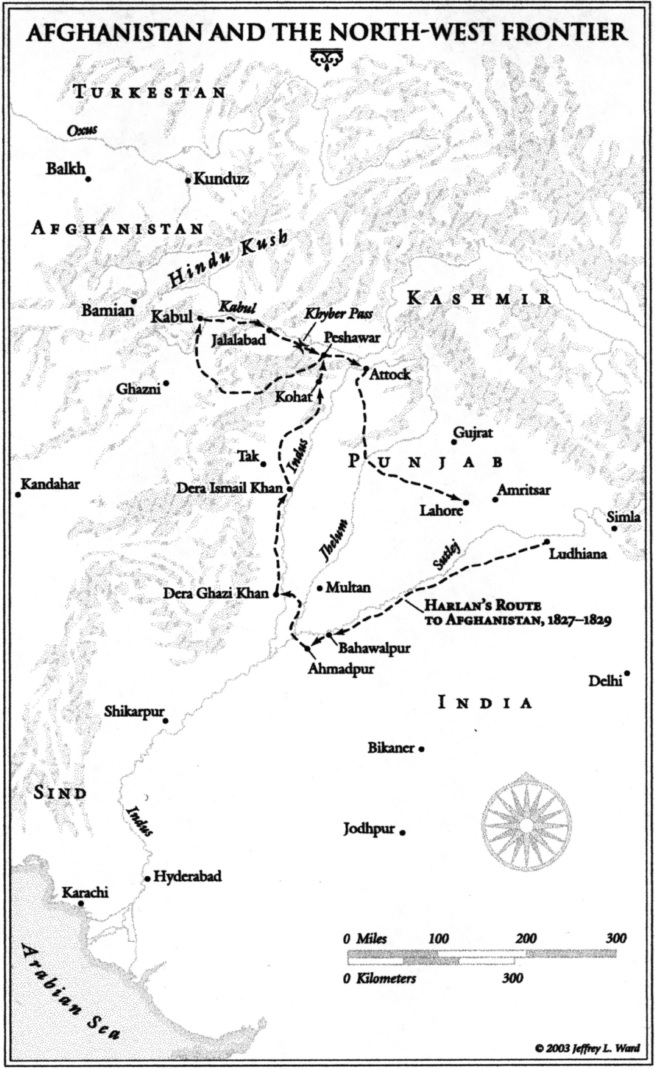
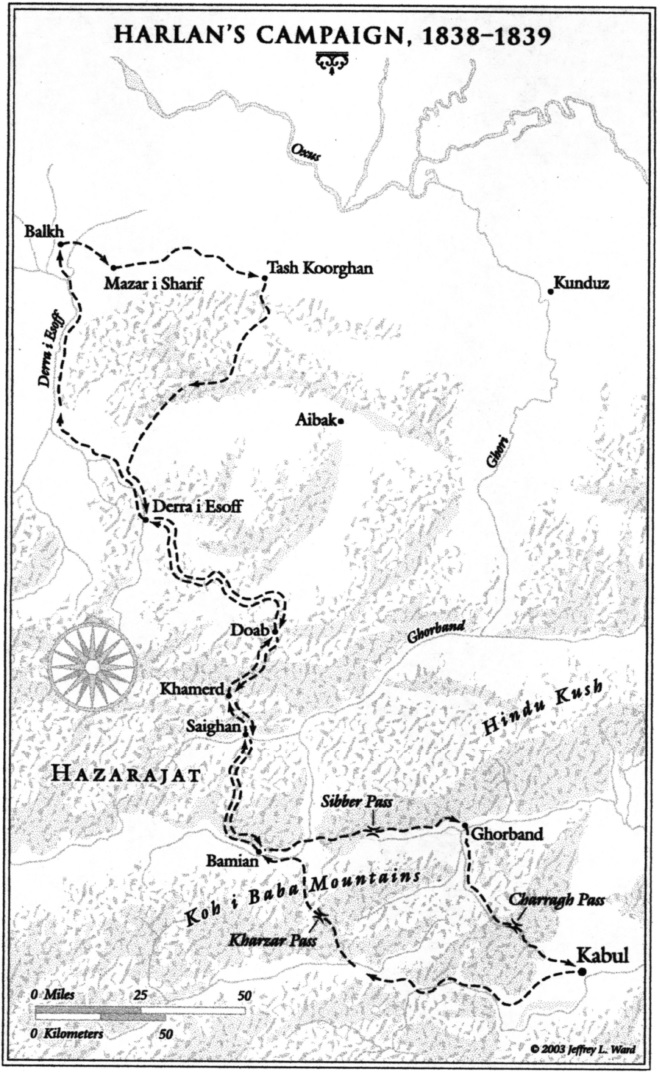
Preface
In the winter of 1839 a conqueror, enthroned on a large bull elephant, raised his standard in the wild mountains of the Hindu Kush. His soldiers cheered, fired matchlock rifles into the air, and beat swords against their hide shields. Two thousand native horsemen shouted their loyalty, each in his own tongue: Afghan Pathans, Persian Qizilbash, Hindus, Uzbeks, Tajiks and Hazaras of the highlands, descendants of the Mongol horde. Six cannon roared to salute the flag, the echoes ricocheting across the snowy pinnacles.
The commander reviewed his troops with satisfaction. Although he was not yet forty, the face above the long black beard was as rugged as the landscape around it. Beneath a flowing fox-fur cloak he wore robes of maroon and green satin, a girdle of silver and lace, and a great silver buckle in the shape of a soldier’s breastplate. His catskin cap was circled with gold.
Like Alexander of Macedon, who had led his army on the same mountain path twenty-one centuries earlier, the leader was called great by his followers, and his titles, past, present and future, were many: Prince of Ghor, Paramount Chief of the Hazarajat, Lord of Kurram, governor of Jasrota and Gujrat, personal surgeon to Maharajah Ranjit Singh of the Five Rivers, the Highly Stationed One equipped with Ardour and Might, Chief of the mighty Khans, Paragon of the Magnificent Grandees, Holy Sahib Zader, Companion of the Imperial Stirrup, Nearest Friend of Shah Shujah al-Moolk, King of Afghanistan, Chief Sirdar and Commandant of the invincible armies of Dost Mohammed Khan, mighty Amir of Kabul, Pearl of the Ages and Commander of the Faithful. Hallan Sahib Bahadur, victor of the battle of Jamrud, slayer of infidel Sikhs, scourge of Uzbek slavers, was even said to have magical powers. Some claimed that he was an expert alchemist who had forged a priceless talisman to make the dumb speak and conjured gold from base metal, a teller of stories in every tongue, and master in the art of intrigue. In his own language, the prince was known by other names: doctor, soldier, spy, botanist, naturalist and poet; but also mercenary, even mountebank.
His Highness never travelled without his books, and when the guard had been posted for the night and the mastiffs howled to ward off the wolf packs in the ravines, he retired to his tent and wrote, tumbling torrents of words in a language none but he could read. In his journal he recorded: ‘I unfurled my country’s banner to the breeze, under a salute of twenty-six guns, and the star-spangled banner gracefully waved amidst the icy peaks, seemingly sacred to the solitude of an undisturbed eternity.’
For His Highness Hallan Sahib had another name, and another title: Josiah Harlan, Quaker, of Chester County, Pennsylvania.
Prologue
In 1989, as an aspiring foreign correspondent, I was sent to Afghanistan to cover the final stages of the decade-long war between the Soviet army and the CIA-backed Mujahideen guerrillas. Afghanistan was then the crucible of the Cold War. Just as the Russians and British had tussled for pre-eminence there in the nineteenth century, in the undeclared war Rudyard Kipling called ‘The Great Game’, so the US and USSR fought for supremacy in the Afghan mountains at the end of the twentieth. The Soviets were losing, and would soon withdraw, leaving behind 50,000 dead soldiers and a million dead Afghans.
Having made arrangements to link up with one of the seven Mujahideen groups, I headed to Peshawar on Pakistan’s Northwest Frontier, forty miles from the Afghan border. Once a part of Afghanistan itself and the summer capital of the Afghan kings, Peshawar was the principal staging post in Pakistan for the anti-Soviet insurgency. The bazaar was thronged with tough-looking Pushtuns, the Afghan warrior tribe the British knew as Pathans, many with machine guns slung casually over their shoulders. An enterprising stallholder offered to sell me a captured Soviet tank. I settled instead for the standard Mujahideen outfit, obligatory for any ‘resistance tour’: Pathan pancake hat and dun-coloured saggy pyjamas, or shalwar kamiz, over which I wore the regulation foreign correspondent’s sleeveless jacket with many unnecessary pockets. I had already grown something that might pass for a beard.
At dawn the next day, a trio of armed Mujahideen knocked at the door of my hotel room and led me to a waiting Jeep. For the next twelve hours we drove up the Khyber Pass, and then onto rocky tracks which wound deep into the mountains, until we finally arrived at the camp of the Mujahideen commander Gulbuddin Hekmatyar. I was too callow to know it at the time, but black-bearded Hekmatyar was the most fundamentalist of the Mujahideen leaders, a man as ruthless as he was ambitious, whose brutal shelling of Kabul in the civil war that followed killed thousands of civilians and devastated the city. The entrance to his camp was marked by a lone sentry and a large, dead vulture, impaled on a post, the first victim I had seen of the Afghan war.
Over the ensuing weeks I was swept away by my own Afghan adventure. The Mujahideen fighters looked after me as one might a vulnerable and rather dim younger brother, and I filed breathless despatches for my newspaper, with rather too much emphasis on the first person. I thought myself very dashing indeed.
Returning to Peshawar after my first stint ‘inside’, I went to the American Club, the social hub of the Western crowd. The place was often frequented by journalists, young ones like myself but also scarred veterans, along with arms dealers, aid workers and monosyllabic Americans who were probably spies or mercenaries. Almost everyone had stories of night skirmishes and narrow escapes, the self-inflating chaff of the war zone. We were all living out our romantic fantasies in a land that invited and nourished them.
During the day we lounged around the pool, and relaxed by swimming, planning and Kipling. The works of Rudyard Kipling were required reading, for Britain’s bard of imperialism captured the wildness and wonder of the North-West Frontier like no other writer, before or since. It was in Peshawar, fresh from my first foray into Afghanistan, that I first read ‘The Man who Would be King’, Kipling’s timeless short story which John Huston would adapt into a film starring Sean Connery and Michael Caine. Written in 1888, when Kipling was just twenty-three and working as a journalist for the Allahabad Pioneer, ‘The Man who Would be King’ tells the tale of a bearded adventurer, Daniel Dravot, who penetrates the remotest mountains of Afghanistan in the middle years of Victoria’s reign, disguised as a Muslim holy man. Following the trail of Alexander the Great deep into the Hindu Kush, he trains a tribal army and is crowned king by the local tribesmen. Adopting the symbols of Freemasonry, he proclaims his own fake religion and is exalted as a living god until, like all who aspire to deity, he crashes to earth. It is thrilling stuff, a story of freelance imperialism in which a white man becomes a powerful potentate in a distant land, but also a cautionary tale of colonial hubris, ending in disaster. The narrator is a newspaperman, who hears the story from the adventurer’s dying partner. ‘The Man who Would be King’ made a profound and lasting impression on me.
Over the next few years I made several more reporting trips to Afghanistan, and twice visited Kabul, but after the Soviets retreated the West swiftly lost interest. The defeat of the Soviet army by the Afghan Mujahideen contributed to the collapse of Communism, but as Afghanistan fractured into civil war, the country was left to slide towards fundamentalism, eventually producing Islam’s most mutant form, the extremist, terrorist Taliban. Long before the rule of the Mullahs the news story had moved on – and so had I, to New York, then Paris, and finally to Washington. I returned to Britain just a few days before 11 September 2001.
In the wake of that atrocity, as America declared war on terrorism and the Taliban, I found myself writing about Afghanistan again, trawling through the histories to piece together a narrative of that broken land for my newspaper. While American ‘daisy cutter’ bombs were blasting al Qaeda fighters out of the caves of Tora Bora and special forces were hunting through the same Afghan hills I had known a decade earlier, I was combing the stacks of the British Library.
There was one name that caught my attention, deep in the footnotes of the books about nineteenth-century Afghanistan: Josiah Harlan, the first American ever to enter that country. A Pennsylvania-born Quaker and Freemason, Harlan had slipped into Kabul disguised ‘as a dervish’ in 1824, long before the British got there. He was said to have trained an army for the amir of Kabul, crossed the Hindu Kush, and proclaimed himself a prince in the mountains. His story sounded impossibly romantic, deeply implausible, yet strangely familiar.
I was not the first to notice the similarity between this life and Kipling’s short story. The US State Department précis on Afghanistan notes that ‘Josiah Harlan, an adventurer from Pennsylvania who was an adviser in Afghan politics in the 1830s, reputedly inspired Rudyard Kipling’s story “The Man who Would be King”.’ Harlan’s reputation would certainly have been known in Allahabad when Kipling was working there: the novelist adapted the American Freemason and former soldier into an English Freemason and former soldier, but the parallels between the real Josiah Harlan and the fictional Daniel Dravot, Kipling’s self-made King of Kafiristan, are too close to be coincidental.
There were tantalisingly few details about the life of the American, and the principal contemporary sources, almost all British, were conspicuously hostile. The first official British history of the First Afghan War (1839–42) dismissed him as ‘clever and unscrupulous … an American adventurer, now a doctor and now a general, who was ready to take any kind of service with any one disposed to pay him’. Harlan published only one book in his lifetime, a polemical anti-British tract. In 1939, more than sixty years after his death, a researcher pulled together some fragments of his unpublished work, but concluded that the bulk of Harlan’s writings – journals, letters and an entire manuscript recording his adventures – had all been destroyed in a house fire in 1929.
Harlan, it seemed, was doomed to remain a fleeting and enigmatic presence in history, a figure in fiction, but not in fact. Yet as American soldiers poured into Afghanistan at the beginning of the twenty-first century, this unwritten half-life seemed uncannily contemporary. Harlan had taken the pioneer spirit to a completely different frontier. Here was a wild west figure in the far wilder East, who had achieved the unique feat of voyaging over the sea to a ‘terra incognita’ and proclaiming himself a king. Yet in his own country he was entirely unknown.
I extended my search: to the Punjab, where Harlan had lived in the 1820s; to his birthplace in Pennsylvania; to San Francisco, where he died; and back to Kabul. Gradually his life began to take shape: in the official records of Maharajah Ranjit Singh of Lahore, in the memoirs and diaries of contemporary travellers and soldiers, and in the intelligence archives of imperial India. In a tiny museum in Chester County, Pennsylvania, I finally discovered Harlan’s lost voice: in an old box, buried and forgotten among the files, was a tattered manuscript handwritten in curling copperplate, a large section of Harlan’s missing autobiography, unnoticed and unread since his death, along with letters, poems and drawings.
In 1842, Harlan boasted to a newspaper reporter that he had once been the Prince of Ghor or Ghoree, a realm high in the Hindu Kush, under a secret treaty with its ruler. ‘He transferred his principality to me in feudal service, binding himself and his tribe to pay tribute for ever,’ Harlan was quoted as saying. ‘The absolute and complete possession of his government was legally conveyed according to official form, by a treaty which I have still preserved.’ This contract was assumed to be lost. Some claimed it had never existed. But there, yellow with age at the bottom of the box, was a document, written in Persian and stamped with an intricately beautiful oval seal: a treaty, 170 years old, forged between an Afghan prince and the man who would be king.

1 A COMPANY WALLAH
Josiah Harlan’s hunt for a crown began with a letter. A grubby, much-handled, unhappy letter that followed the young American merchant seaman from Philadelphia to Canton in China, and finally to Calcutta, the teeming capital of British power in India, in 1822. It was written by one of Harlan’s brothers, back in Chester County, Pennsylvania, who had entrusted it to another seaman, bound for the East, in the hope that the bad news might reach Josiah before he set sail for home. After many months, the dog-eared document caught up with Harlan in Calcutta: he read it, burned it, swore that he would never return to America, and set off alone on an eighteen-year odyssey into the heart of Central Asia.
That was the way Harlan remembered it. A Byronic act of impulse prompted by a broken promise and an injured heart; but in truth his journey had started many years earlier. It began in the avid imagination of a schoolboy, in the dockside stories of the seamen, in a newly-born American empire of limitless promise and adventure. It began in the mind of a youth who was born a humble Quaker, but imagined himself an ancient king.
Joshua and Sarah Harlan, Harlan’s parents, were prosperous, pious people of quiet pacifism and deep faith. A merchant broker, Joshua had made sufficient money in the great port of Philadelphia to buy a small farm in Newlin Township, Chester County, where he had raised a large family. There had been Harlans in the county since 1687, when one Michael Harlan, from Durham in England, had emigrated like so many Quakers to the New World. Joshua and Sarah were plain of dress and speech, rejected the trappings of worship, never swore an oath or drank a drop of alcohol, and passionately opposed war. They were, therefore, somewhat unlikely candidates to produce a son who would become an Oriental potentate with his own army and a taste for exotic royal costumes.
Josiah Harlan arrived, with little fanfare, on 12 June 1799, the latest addition to a brood that already included Ann, James, Charles, Sarah, Mary, Joshua, William and Richard. Edward was born four years later. We know little of Josiah’s earliest years, save that they were noisy, joyful and scholarly, for the Quaker education system was excellent. Josiah read widely and voraciously: Shakespeare and Burke, Pliny and Plato, histories and romances, poetry and politics, treatises on natural history, physics, and chemistry.
Josiah was just thirteen when his mother died, worn out by childbirth. Sarah bequeathed an estate of $2,000 to her three daughters, but left nothing to her seven sons, who were expected to make their own fortunes – which they did in ways that show Josiah was not the only Harlan anxious to explore the world beyond Chester County. Charles departed for South America as soon as he was old enough to leave home, and was never seen again; James went to sea and died aboard an English man-of-war at the age of twenty-seven; and Richard wandered the East before becoming a celebrated anatomist (his hobby was studying human crania, and he finally amassed 275 of them, the largest collection in America). While the sons of the family were off collecting crowns of gold and bone and dying in exotic locations, the daughters remained at home: all three of Josiah’s sisters would die spinsters in Chester County.
Motherless, Josiah Harlan plunged deeper into a world of imagination and learning. At the age of fifteen, one contemporary recorded, he ‘amused himself with reading medical books and the history of Plutarch, as also the inspired Prophets’. A natural linguist, he read Latin and Greek, and spoke French fluently. He could put his mind and hand to anything, whether or not the results were worth it: his poetry was poor, and his watercolours were worse. Botany became a passion, and his writings overflow with observations on plants and flowers, wild and cultivated. His prose style, particularly at moments of emotion or elation, tended towards the flowery.
Above all, he steeped himself in Greek and Roman history. Many years later, an educated traveller who came across Harlan in the wilds of the Punjab found him immersed in classical literature, ‘in the which study I found him wonderfully well versed’. Harlan’s obsession with Alexander the Great dates from his earliest boyhood. He could recite long passages from Plutarch’s The Age of Alexander, and he carried a copy of The History of Alexander by Quintus Curtius Rufus throughout his travels. Alexander’s conquests in Persia, Afghanistan and India, were an inspiration to the young man growing up among the placid green fields of Pennsylvania, and he idealised the Macedonian conqueror: ‘In seven years Alexander performed feats that have consecrated his memory amongst the benefactors of mankind, and impressed the stamp of civilization on the face of the known world,’ he wrote. Harlan would follow Alexander to the uncharted corners of Afghanistan, and back again.
A young American in a young America, Josiah Harlan was impatient, ambitious and utterly convinced of his own abilities: some considered him arrogant, others thought him charming; no one ever found him boring. By the age of eighteen he was over six feet tall, a striking, muscular, raw-boned and handsome young man with a long face, high forehead and somewhat unsettling dark hazel eyes. He might have been the embodiment of a growing nation in young adulthood, as described by Henry Adams: ‘Stripped for the hardest work, every muscle firm and elastic, every ounce of brain ready for use, and not a trace of superfluous flesh on his nervous and supple body, the American stood in the world a new order of man.’



